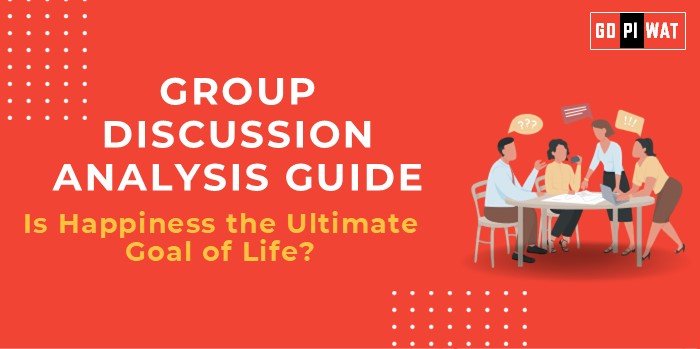📋 Group Discussion (GD) Analysis Guide: Is Happiness the Ultimate Goal of Life?
🌐 Introduction to the Topic
Opening Context: “Happiness is a universal pursuit, cutting across cultures, philosophies, and religions. It is often regarded as the cornerstone of a meaningful life, yet debates continue about whether it is the ultimate goal or a byproduct of other pursuits.”
Topic Background: From ancient Greek philosophers like Aristotle, who espoused the concept of “eudaimonia” (flourishing), to modern positive psychology, happiness has been a central theme in understanding human existence.
📊 Quick Facts and Key Statistics
- 🌍 Global Happiness Index (2023): Finland ranked #1, reflecting the importance of well-being over material wealth.
- 🧠 Mental Health: WHO reports that nearly 1 billion people worldwide live with a mental disorder, underscoring challenges to global happiness.
- 📜 Philosophical Approaches: 70% of global philosophical schools link happiness with moral virtue or purposeful living.
- 📈 Economic Measures: Bhutan’s Gross National Happiness Index prioritizes well-being over GDP.
👥 Stakeholders and Their Roles
- 🏛️ Governments: Shape policies promoting well-being (e.g., health, education, work-life balance).
- 📚 Psychologists and Academics: Study happiness determinants and advocate interventions.
- 📿 Religious Institutions: Offer spiritual frameworks for achieving happiness.
- 👥 Citizens: Participate in practices and choices affecting personal and societal happiness.
🏆 Achievements and Challenges
✨ Achievements:
- 🧘 Global Mindfulness and Mental Health Initiatives: Increasing awareness and accessibility worldwide.
- 📈 Adoption of Happiness Indices: Bhutan, UAE, and other nations now prioritize happiness metrics.
- 💼 Evidence Linking Happiness to Productivity: Happier individuals tend to live longer and contribute more effectively to organizations.
⚠️ Challenges:
- 🛑 Rising Mental Health Issues: Societal pressures contributing to global crises in mental well-being.
- ⚖️ Inequity in Resource Access: Disparities in availability of happiness-promoting resources.
- ❓ Material Wealth Paradox: The Easterlin Paradox highlights how wealth doesn’t always equate to happiness.
🌐 Global Comparisons:
- 🇫🇮 Scandinavian Countries: Social policies ensure higher happiness rankings.
- 🇺🇸 High GDP Nations: Countries like the USA rank lower on happiness indices due to societal stress.
📖 Case Study: Bhutan’s Gross National Happiness framework integrates cultural preservation, economic development, and environmental sustainability.
💬 Structured Arguments for Discussion
- ✔️ Supporting Stance: “Happiness is the ultimate goal, as it encapsulates health, relationships, and self-fulfillment.”
- ❌ Opposing Stance: “Happiness is transient; purpose, virtue, and impact define human existence.”
- ⚖️ Balanced Perspective: “Happiness is an important goal but works best as a byproduct of meaningful living.”
🛠️ Effective Discussion Approaches
- 🎯 Opening Approaches:
- 📊 “Studies show that happiness boosts life expectancy by 10%, highlighting its fundamental role.”
- 📖 “Aristotle’s eudaimonia links happiness to a life of virtue and fulfillment.”
- 🔄 Counter-Argument Handling:
- Use data (e.g., rising happiness indices despite economic disparity) and examples (e.g., social welfare in Finland) to rebut opposing views.
🔍 Strategic Analysis of Strengths and Weaknesses
- 💪 Strengths: Universal relevance; supported by interdisciplinary evidence.
- ⚡ Weaknesses: Subjective nature; influenced by external factors.
- 🌟 Opportunities: Integrate happiness with economic policies.
- ⚔️ Threats: Rising mental health crises; cultural misunderstandings.
📚 Connecting with B-School Applications
- 🌍 Real-World Applications: Policy frameworks prioritizing employee well-being, mental health initiatives.
- ❓ Sample Interview Questions:
- “Can happiness metrics be a better measure than GDP?”
- “How would you incorporate happiness into organizational strategy?”
- 💡 Insights for B-School Students:
- Reflect on happiness in leadership styles.
- Explore its role in sustainable organizational practices.


